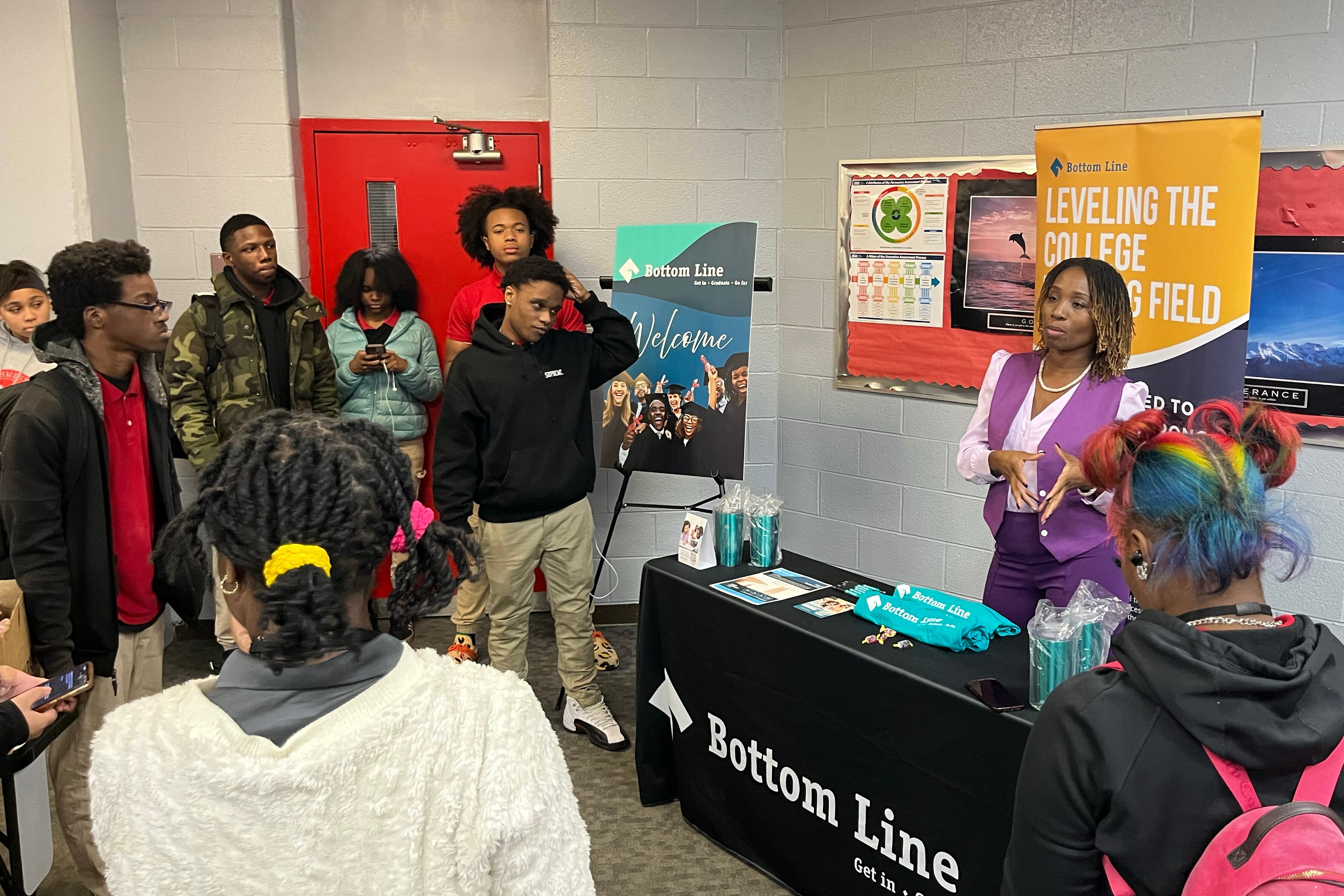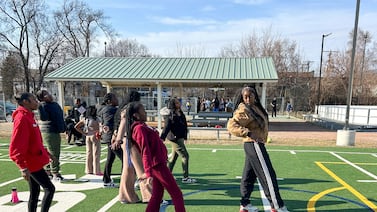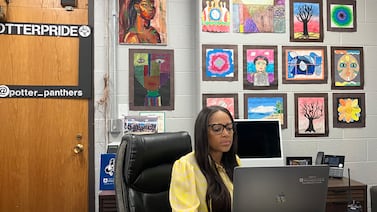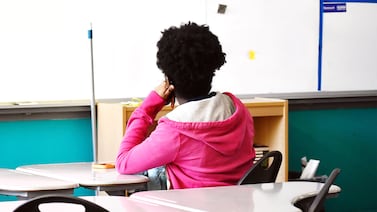Sign up for Chalkbeat Detroit’s free daily newsletter to keep up with the city’s public school system and Michigan education policy.
Northwestern High School holds a special place in Danielle North’s heart.
She credits the Detroit school for connecting her with a program that helped her secure her first job and become a first-generation college student more than 20 years ago.
Today, the 42-year-old is back at her alma mater and preparing for the launch of a new program that she hopes will provide Detroit high school students with the same kind of opportunities.
Northwestern this fall will become the newest site for Bottom Line, a nonprofit initiative that gives students from first-generation and low-income backgrounds one-on-one mentorship and guidance for up to six years – from their senior year of high school and throughout college.
Originating in Boston in 1997, Bottom Line serves around 9,000 students in Massachusetts, as well as New York City, Chicago, and Dayton, Ohio.
North said Bottom Line’s Detroit-based program will be geared toward incoming 12th graders who come from a low-income household and have a minimum 2.5 GPA. Enrollment begins early next year.
In addition to Northwestern, Bottom Line Detroit will have four other hubs: Detroit Edison Public School Academy, University Preparatory Academy High School – Ed Parks Campus, The School at Marygrove, and East English Village Preparatory Academy.
“During this initial planning phase, we will garner the interest of students, begin to set up where our space will be at each location and come February, that’s when our enrollment period opens up,” said North, who was selected in October to serve as the Detroit program’s executive director. “Ultimately, by the fall of next year, we want no less than 180 students. We want to serve as many students as we can.”
Supporting young people in the D
Shauwea Hamilton, chief regional officer for Bottom Line, said the program has considered launching a site in Detroit since 2020.
Once the pandemic started to wind down, she said, the team began talking to partners, colleges, high schools, and community leaders and received funding from the Jacob Family and Kresge foundations, Ballmer Group, and GreenLight Fund Detroit, which is providing a $600,000 unrestricted, multi-year grant and ongoing, in-kind coaching and assistance. This will help support the program’s aim of reaching 725 Detroit students annually by 2031, achieving a 95% college enrollment rate and an average student debt of $19,000 after graduation.
“It’s exciting to be serving students in the largest Black-majority city in the country. That is really exciting for me as a Black leader,” Hamilton said. “And it was really grounded in relationship building and not just our belief, but the belief of the folks that we were talking to and engaging with, that we would be an added benefit to support young people in Detroit.”
In a city where fewer than 20% of residents hold college degrees and the median income averages around $37,000, Detroit students face many barriers when it comes to enrolling in college. Some of those challenges include the rising cost of tuition, skepticism from families on the value of a college education, and academic readiness. Many high school students are not getting the preparation they need to handle college courses or trade schools, according to the Education Writers Association. And the biggest gaps in preparation largely affect students of color and those from low-income families. Almost half of high school graduates had no cohesive college or career-prep curriculum while they were in high school, notes a 2016 report from The Education Trust.
Another factor is that there are less counselors in high schools to help students navigate the college process.
There’s a shortage of school counselors nationwide, but Michigan has one of the worst student-to-counselor ratios, ranking 48th in the country with an average of one counselor for every 615 students, according to data from the 2020-21 school year. The national average is 408 students per counselor. The American School Counselor Association recommends a counselor for every 250 students.
College advisers help fill in some of those gaps for counselors by guiding students with applications and financial aid. But in the Detroit Public Schools Community District, many college transition advisers were cut last year due to a pandemic-fueled enrollment decline and the depletion of federal COVID relief aid.
North said Detroit’s Bottom Line program is aiming for a ratio of one adviser to every 60 to 65 students.
North plans to hire three advisers to start in the fall. If the number of students in the program exceeds 180, then they’ll hire more, she said. There will also be opportunities for community members to volunteer at a later date, she said.
North said she’s excited to assist students during the early stages of the college process while they’re still in high school. Launching the program at Northwestern makes the new position even sweeter.
“I was already excited,” she said, ”But coming here and having the opportunity to interact with the staff and learn directly from the students what their experiences have been, to see the glimmer of light in their eyes, to see their future possibilities from their point of view and to understand what they’re looking for, has really just cemented it.”
Northwestern Principal Kimberly Rogers said every student in the high school who is eligible for Bottom Line will be enrolled. Northwestern was recognized this month by the Detroit Public Schools Community School District board as one of the top five DPSCD high schools out of 25 for enrollment in college and career level courses for the 2023-24 school year. It was also part of the College Board AP School Honor Roll, which recognizes schools whose AP programs are broadening access to college-level course work.
“It’s important to know that students who are staying in school will have support because sometimes, it’s difficult to navigate large institutions that do not have programs focused and centered on first-generation students,” Rogers said.
Making the college process easier
As of 2020, 54% of undergraduates nationally had parents who did not have a bachelor’s degree, according to FirstGen Forward Network, a group of higher education institutions dedicated to helping first-generation college students achieve success. Most of those undergraduates are students of color, with Hispanic students coming in at 73%, followed by Black students at 65%, and Indigenous and Pacific Islanders at 64%.
In Michigan, first-generation students vary by institution, but the University of Michigan has about 4,000 first-generation students out of its overall enrollment of 52,855 students this fall. Meanwhile, Michigan State University states more than 1 in 5 students are first generation. MSU’s enrollment for fall 2024 was 52,089 students. At Detroit’s largest college, Wayne State University, more than 9,000 of undergraduate students — including 42% of the 2024 incoming class — are first-generation college students. The total enrollment for the fall semester was 23,964 students.
However, nationally only 20% of first-generation students graduate, compared to 49% for continuing-generation students, FirstGen Forward reported.
Bottom Line is hoping to fill in those gaps and eliminate that inequity for low-income students of color, Hamilton said. As a first-generation graduate, she said that was one of the reasons why she joined the organization in 2018.
“The narrative about getting in is pretty pronounced. I think the narrative about how to leverage the college experience, gain the most out of it, and successfully get the degree is a lot harder to find,” Hamilton said. “Those supports really would have been beneficial for me. It’s the idea of helping a version of myself. It is a challenge to navigate the college system for the first time, and Bottom Line does that.”
The organization offers three programs. Its Access Program offers advisers to provide step-by-step guidance for high schoolers, such as filling out college applications, perfecting admission essays, applying for financial aid and searching for scholarships.
Bottom Line’s Success Program has advisers meet with students on campus, assist them with enrollment, financial aid, housing, and class registration. The advisers will also be there to help students with problem solving and navigating challenges throughout their time on campus.
In addition, the nonprofit offers the Bluprint Program, where students can chat with Bottom Line’s AI bot, Blu, and get virtual support from advisers.
According to its website, Bottom Line students have a 66% college acceptance rate, 91% of Access students go to college, and, in 2023, the average debt for Bottom Line students was under $17,000 — more than $20,000 less than the national average.
“The idea of having somebody who does this for a living, year in and year out, advising you, offers a different level of confidence in your choice and really helps jump start into a successful undergraduate experience,” Hamilton said.
Ashley Williamson hopes to be one of those undergraduate students. The Northwestern junior is contemplating going to Wayne State after graduation, but is also looking into UM and Central Michigan. Williamson, 16, has a passion for helping Detroit youth and is thinking about a career in social work.
“I’m really community-based. I like to try to stay as humble as I can and give back,” she said.
Williamson said she knows that she doesn’t have the answers to everything, so having a mentor would be beneficial.
“Having this opportunity to help me is all I’ve wanted,” she said. “I’ve been nervous about college and not knowing what to do, but having this program will definitely benefit me a lot.”
Micah Walker is a reporter for BridgeDetroit. You can reach her at mwalker@bridgedetroit.com.







